| Reviews & Columns |
|
Reviews DVD TV on DVD Blu-ray 4K UHD International DVDs In Theaters Reviews by Studio Video Games Features Collector Series DVDs Easter Egg Database Interviews DVD Talk Radio Feature Articles Columns Anime Talk DVD Savant Horror DVDs The M.O.D. Squad Art House HD Talk Silent DVD
|
DVD Talk Forum |
|
|
| Resources |
|
DVD Price Search Customer Service #'s RCE Info Links |
|
Columns
|
|
|
Thomas Mann Collection, The
Koch Vision's The Thomas Mann Collection is a mammoth nineteen hour, three film compilation that features adaptations of the Nobel Prize-winning author's Buddenbrooks, Doktor Faustus, and The Magic Mountain. Each film is distinctly different in approach, providing a rich viewing experience for the adventurous - and patient - DVD viewer. Some viewers may be turned off by the use of English subtitles, or the deliberate, languorous pacing of the films, or the less-than-optimal DVD transfers. But the benefits of seeing these rare German feature film and TV adaptations more than outweigh those factors. The last time I tried to tackle Thomas Mann was back in college. When I told a friend how much I had enjoyed Katherine Anne Porter's novel Ship of Fools, she suggested I try "the real deal," The Magic Mountain. Having just plowed through Porter's behemoth, I wasn't really ready for another gigantic, heavy, existential cry of pain, so I bailed about a third of the way in. But the films in The Thomas Mann Collection did what all good cinematic adaptions should do: they stood as entertaining films in their own right, and they made me want to go back and read the original source novels.
BUDDENBROOKS
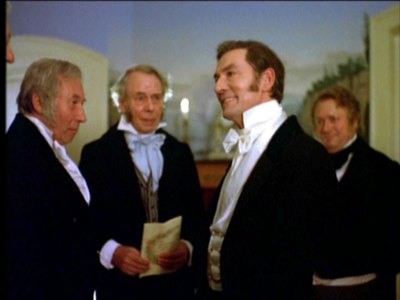
While there isn't space here to even give a sense of the intricate plot or myriad characters in the almost eleven hour Buddenbrooks, I can give you a ridiculously sketchy idea of where the story goes. Buddenbrooks chronicles the inevitable physical, spiritual and financial decline of a wealthy, influential merchant family in the mid-to-late 19th century city of Lubeck, Germany. The Buddenbrooks family, led by Johann, Sr. (Carl Raddatz), is a proud member of the waning Hanseatic League of business guilds, providing shipping and exporting for grains and other farm products. Their company has been in business for decades, and it has attained a reputation for sterling honesty and integrity, which Johann, Sr. takes care to impart to his son, Johann, Jr. (Martin Benrath). All familial duties are seen in light of how they may affect the company; lives within the family are always to be led with the company's best interests at heart - first, last and always.
When Johann, Sr. dies, it is up to Johann, Jr. to carry on the family business and uphold their personal reputation. As with most family dynasties of this period, the head of the clan always looked forward, nurturing sons and daughters to be either productive members of the business, or in the case of daughters, properly wedded off to socially desirable - and profitable - suitors. Johann must cope with his daughter Tony's (Marion Kracht) disastrous marriage to swindler Grunlich (Michael Degen), as well as ne'er-do-well son Christian (Alexander Stolze), a sensitive child who soon becomes a starry-eyed dreamer with absolutely no aptitude for business. Fortunately, Johann has son Thomas (Michael Kebschull), a dedicated businessman who learns the family ropes early, and clearly looks to supercede even Johann's great success.
But events, both historical and spiritual, conspire to work against Johann's plans. While the business continues to prosper, fatal flaws within Thomas eventually spell potential doom for the business, as well as in his dealings with his brother, his wife Gerda (Noelle Chatelet), and his sensitive, weak son Hanno (Adem Rimpapa). As the 20th century rapidly approaches, the Buddenbrook family and business look considerably changed from our first view of this vigorous, prosperous family.
Having never read the book, I can't claim any special knowledge of what is or isn't left out of this long, long TV miniseries adaptation. What I can say is that Buddenbrooks, clocking in at almost eleven hours, has the stately "great novel" pace and tone necessary (and I believe analogous to the original work) to bring forth a sense of rumination for the viewer. This is an epic, though certainly not in action or even in passionate romance or what we might first think of in terms of melodrama. Buddenbrooks is an epic of historical inevitability, the grinding, remorseless march of time that renders this family a shell of its former glory. Rendered in a realistic, almost documentary style, Buddenbrooks ironically chronicles the battle between family members in the Buddenbrooks clan who want to be free of any obligations to the company, and those members who ultimately feel trapped within their company obligations. What's interesting is that both groups wind up on the losing end. Christian and Tony lead wastrel and unfulfilled lives, respectively, without love or direction, while Thomas is figuratively crushed by the growing weight of his responsibilities, which are made lethal when he forgets the moral lessons of his father during a crucial business deal.
Indeed, Buddenbrooks is particularly strong at showing how almost every single human dealing in the family is first filtered through monetary considerations. Marriages are arranged and broken up due to money; positions in life are determined by positions in business, and personal happiness, regardless of intent or not, are largely determined by how well the omnipresent company is faring in the business world. Buddenbrooks achieves this only through its determination to linger over the finest details. Having almost eleven hours running time to play with, director and screenwriter Franz Peter Wirth (along with co-screenwriter Berndt Rhotert) can fully develop a hyper-realistic atmosphere by showing even the smallest, most telling dramatic moments. For example, there's a particularly long scene where the details of Johann, Sr.'s will are read. Not only are facts and figures of the will detailed, but the personal animosities of the characters are given time to develop over the scene, creating a quiet, but immensely powerful moment. While this kind of stately narrative pace isn't to everyone's taste, it very closely approximates the experience of reading a big novel like Buddenbrooks, and with its careful attention to detail, along with an inexorable, expertly crafted sense of impending doom, Buddenbrooks is that rare long film epic that seems to get shorter the more you become engrossed in its dramatics.
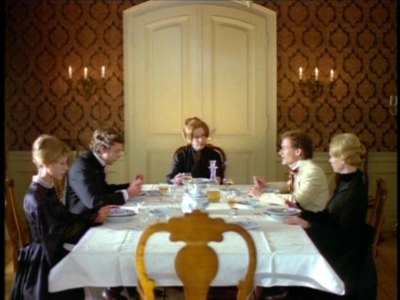
The DVD:
The Video:
Unfortunately, the full screen, 1.33:1 DVD transfer for Buddenbrooks is fairly awful. Not only are the colors largely faded, with a soft, fuzzy picture, there's a distinctly annoying image defect of frame stutter from the European PAL transfers to NTSC, which cause real headaches, particularly during camera pans. I suspected this was a problem of conversion from the European masters to NTSC, and fortunately, fellow DVDTalk reviewer Josh Zyber provided me with a confirmation, a load of stats -- and the proper technical jargon (I was prepared to go with, "It looks like those wind-up toy TVs you had as a kid").
The Audio:
The Dolby Digital mono soundtrack is only adequate, but thankfully, the English subtitles keep pace with the original German dialogue track.
The Extras:
There are no extras for Buddenbrooks.
Final Thoughts:
Long, long, long, but totally engrossing, this twelve hour German TV miniseries captures the economic and spiritual decline of a wealthy, influential 19th century German mercantile family in stunning detail. It may prove slow for some, but if you enjoy immersing yourself in an epic novel, Buddenbrooks competently recreates that experience. However, the DVD transfer does compromise your enjoyment, so I can only recommend Buddenbrooks.
DOKTOR FAUSTUS
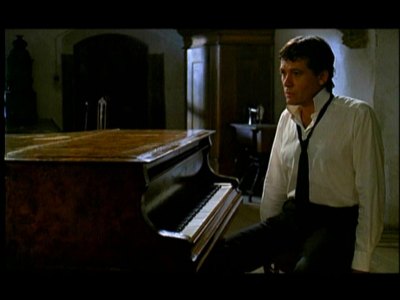
Doktor Faustus updates the classic Faust myth to encompass Germany's descent into the nightmare world of WWII. Detailing the life of Adrian Leverkuhn (Jon Finch), a composer who willingly sells his soul to the Devil in order to produce great works of art, Doktor Faustus simultaneously uses that parable to illustrate the decadent decline of Germany's intelligentsia and ruling class, from the culture that produced Beethoven, to the sick society that instigated World War II. Leverkuhn, who comes to music early through a kindly uncle who manufactures organs and pianos, nevertheless goes to college to study theology. Almost instantaneously rejecting the themes and ideas that he's given in his lectures, Adrian returns to his music studies, contemptuously rejecting the status quo in pursuit of a completely different musical idiom, and seeking the "hellish fire" that will fuel his work.
Furthering his descent into moral and physical degradation, Adrian visits a brothel, where he meets the sensuous dark-haired prostitute Hetaera Esmeralda. Afraid of the consequences to his soul if he sleeps with her, he still returns to the brothel six months later, only to find that she has returned home to Sarajevo. Tracking her down, he sleeps with her, despite her warning that she's sick with syphilis. Wilfully infecting himself to spite God and to court the Devil, Adrian goes through a series of quack treatments to rid himself of the disease, but fate has determined that he will go through with his half-formed idea of selling his soul for immortality in music. Reaching an epiphany, where he meets the Devil in the snow-capped mountains of Bavaria, he finally agrees to the terms of the deal. His disease will continue, but he won't die from it for 24 years. He will reach fame with his compositions, but he can never love anyone human. He will be unable to find warmth in another human being's love (the devil wants his soul cold when its delivered). What commences is Adrian's inevitable physical and mental decline (both from the disease and from his evil pact), and the disastrous impact his deal has on those close to him. A cello player, a beautiful French set designer, and an angelic nephew will all get too close to Adrian, who suffers the final agony of total knowledge of his wasted life.
Utilizing flashforwards, flashbacks, jump cuts, and mysterious, illogical and unexplained images that tease the viewer, Doktor Faustus's filmic treatment is almost 180 degrees in opposition to the classical formalism of the Buddenbrooks adaptation. This isn't surprising when you see that Doktor Faustus was directed by Franz Seitz, the screenwriter for that other surreal German nightmare, The Tin Drum. While never outrageous or overblown in detailing the spiritual and moral decline of Adrian, Doktor Faustus does have a suitably creepy, inexorable pull to its gravely played scenes. Lead actor Jon Finch (excellent here, as always, as he was in Polanski's Macbeth and Hitchcock's Frenzy), despite being dubbed here in German, never overplays the character's inevitable madness and decay. It's a remarkably subtle performance for a role that easily could have lent itself to hamminess or outright parody.
Where Doktor Faustus is less successful is in making the connection between Finch's descent, and the descent of Germany itself into war. Perhaps the theme was too great for the relatively limited scope of the film. Perhaps the personal story of Adrian's pact with the Devil proved too attractive to the filmmakers, and the parallels with Germany's role in WWII were left behind. Either way, a few black and white images of Adrian's friend, hidden in a bunker with the bombs going off, talking about Adrian and Germany having the same fate, aren't enough to make the connection clear. We can guess that the film wants to say something larger about Adrian's devilish pact, and how it mirrors Germany's intellectual and moral decline, but we're never actually shown this connection. Eventually, those flashforwards, however infrequent, become annoying, and we wish the film would stay only with Adrian's story.
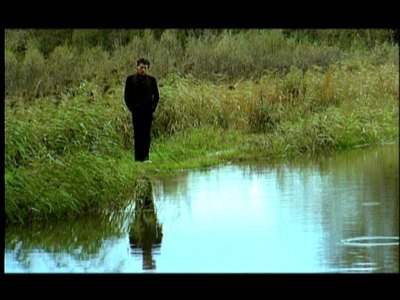
The DVD:
The Video:
The widescreen, 1.78:1 video image for Doktor Faustus looks a little better than Buddenbrooks, but not much. You can tell it was a beautiful film in the theaters, with obvious care taken with the sets and lighting, but much of that impact is diminished here in the generally soft picture and muted colors. There's quite a bit of grain apparent, and again, just as in Buddenbrooks, there's that distracting PAL to NTSC conversion frame stutter during any kind of camera movement.
The Audio:
The Dolby Digital mono soundtrack is only adequate, but thankfully, the English subtitles keep pace with the original German dialogue track.
The Extras:
There are no extras for Doktor Faustus.
Final Thoughts:
While the connection between Adrian's physical and spiritual decline, and that of pre-WWII Nazi Germany, may not be as clear as Thomas Mann would have liked, Doktor Faustus does expertly delineate the moral and religious crisis that Adrian goes through in his fateful pact with the Devil. Jon Finch delivers a memorable performance, worthy of your attention. Too bad again that the DVD transfer is not up to the film's own visual standards. I recommend Doktor Faustus.
THE MAGIC MOUNTAIN
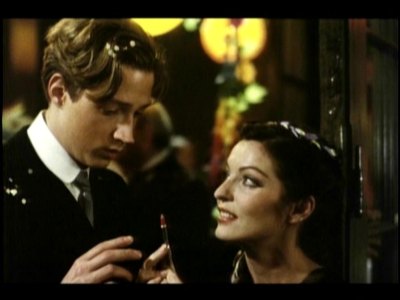
Hans Castorp (Christoph Eichhorn), a recently graduated engineering student on his way to Hamburg where a job building ships awaits him, takes a brief vacation to Dalvos in the Swiss Alps, where his cousin Joachim Ziemben (Alexander Radszun), suffering from TB, is staying at a lung clinic. Almost instantaneously losing track of time, as well as the will to continue on with his life and career, Hans settles into living permanently at the clinic. This decision is reinforced by the clinic's director, Doctor Behrens (Hans Christian Blech), who immediately diagnoses Hans with anemia and almost certain TB.
Slipping into a deeper and deeper dependancy on the clinic's insular, safe world, where illness is celebrated, Hans becomes immediately captivated with Clawdia Chauchat (Marie-France Pisier), a beautiful Russian patient who stays at the clinic more out of avoidance of her marriage, rather than any real illness. Alternately taken with, and contemptuous of, her infatuated suitor, Clawdia eventually allows Hans to sleep with her, before departing for another sanatorium. In the meanwhile, Hans' Uncle James (Helmut Griem) arrives from "the flatlands," hoping to return Hans to the real world. But James sees immediately the strangely debilitating effects of staying at the sanatorium (he's immediately diagnosed with the exact same condition that Hans received from Dr. Behrens on his first day of visiting Joachim), and leaves the very next morning. Freed from any worries now about returning to his former life, Hans settles in happily for a life as an invalid.
Not giving up on his romantic obsession with Clawdia, Hans literally waits years for her to return to the sanatorium, only to find upon her arrival that she has a traveling companion, Mynheer Peperkorn (Rod Steiger), a hedonistic consumptive who graciously (and paternalistically) offers Clawdia to Hans again. Just as Hans celebrates his seventh year at the clinic, WWI rudely interrupts his life of suspended animation, forcing him to leave the soon-to-be shut down clinic.
Thomas Mann famously refused to be specific about any definitive literary interpretation of The Magic Mountain, but from what I can remember of what I read, it's a book so loaded with symbolism, detail, and an epic, ironic scope dealing with multiple themes, that you can pretty much bring to it what you'd like in your reading experience. It's weighty enough for multiple interpretations and readings. The film version settles for a focused look at the mental deterioration of Hans, with an almost supernatural take on the debilitating effects of the sanatorium. Playing at times like a low-key Bavarian The Shining, screenwriter and director Hans W. Geissendorfer maintains a discreet distance from the melodramatics, allowing the funereal mood of the piece to settle in most uncomfortably, until we the audience are constantly looking for signs of a new consumptive case. So successful is Geissendorfer in creating a horror-like atmosphere of the sanatorium, when Hans' uncle arrives to rescue him, we want to yell, "Get the hell out of there!" And sure enough, Uncle James immediately succumbs to the succubus nature of the lung clinic, before wisely hightailing it out of there.
The acting in The Magic Mountain is particularly good, with young Eichhorn quite nicely essaying a difficult, complex role. Pisier is beautiful and seductive, of course, but she also gets across the essentially selfish nature of the character perfectly. And veteran Blech as the director of the clinic (you've seen him in a hundred WWII movies, at least), is marvelous as the shady doctor who cynically sees disease everywhere. The only stumbling block is Steiger's portrayal of Peperkorn. Steiger never met a ham he didn't try to eat or imitate, and his over-the-top performance really goes off kilter in an embarrassing scene in a restaurant. Exhibiting the worst of his stock mannerisms (the hands covering his face, the eyeball-rolling, the screams trailing off into whispers), Steiger may be playing a hedonist here, but he goes over like a deranged lunatic. Fortunately, he's not in the film long, and The Magic Mountain has time to recover before its well-executed conclusion.
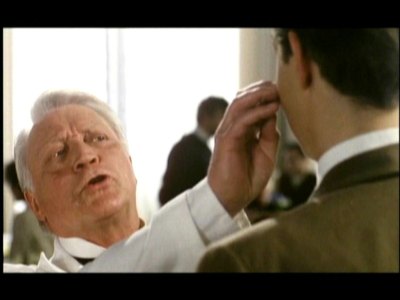
The DVD:
The Video:
Again, the widescreen, 1.66:1 video image for The Magic Mountain is not particularly good, with a dark, dark print, and quite a few scratches and dirt specks. Colors are faded, and at times, the blacks didn't hold true. And again, just as in Buddenbrooks and Doktor Faustus, there's that distracting PAL to NTSC conversion frame stutter during any kind of camera movement
The Audio:
The Dolby Digital mono soundtrack is only adequate, but thankfully, the English subtitles keep pace with the original German dialogue track.
The Extras:
There are no extras for The Magic Mountain.
Final Thoughts:
With an emphasis on lurking horror behind the doors of a supernaturally animated lung clinic, ready to spread its evil and ennui to unsuspecting visitors, this film adaptation of The Magic Mountain has a hypnotic pull to its dramatic design. Aided by first-rate performances and a startlingly clear vision of the psychotic appeal of false nobility and self-destruction through illness, The Magic Mountain provides a memorably unsettling viewing experience. I highly recommend, even with the only fair print quality, The Magic Mountain.
Final Thoughts:
The Thomas Mann Collection provides a unique opportunity to see German adaptations of celebrated author Thomas Mann's most famous literary works. Each film provides a rich, compelling atmosphere for the alternately heavy Germanic philosophizing, and subtly perverse meditations on sex, illness, free will, and man's seeming head-long rush into self-destruction and oblivion. Running a mammoth nineteen hours, The Thomas Mann Collection's three films are necessary viewing for those interested in cinematic adaptations of literary works, for Thomas Mann enthusiasts, and for anyone looking for thought-provoking, serious drama. Even with the relatively poor DVD transfers, I recommend The Thomas Mann Collection.
Paul Mavis is an internationally published film and television historian, a member of the Online Film Critics Society, and the author of The Espionage Filmography.


|
| Popular Reviews |
| Sponsored Links |
|
|
| Sponsored Links |
|
|
| Release List | Reviews | Shop | Newsletter | Forum | DVD Giveaways | Blu-Ray | Advertise |
|
Copyright 2024 DVDTalk.com All Rights Reserved. Legal Info, Privacy Policy, Terms of Use,
Manage Preferences,
Your Privacy Choices | |||||||














